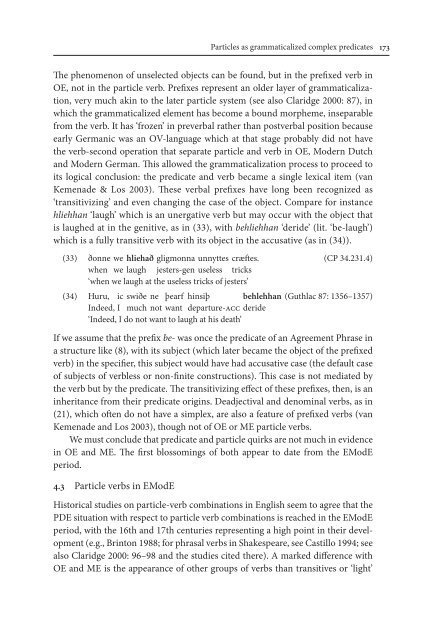Selected Papers from the Fourteenth International ... - STIBA Malang
Selected Papers from the Fourteenth International ... - STIBA Malang
Selected Papers from the Fourteenth International ... - STIBA Malang
Create successful ePaper yourself
Turn your PDF publications into a flip-book with our unique Google optimized e-Paper software.
Particles as grammaticalized complex predicates 17<br />
The phenomenon of unselected objects can be found, but in <strong>the</strong> prefixed verb in<br />
OE, not in <strong>the</strong> particle verb. Prefixes represent an older layer of grammaticalization,<br />
very much akin to <strong>the</strong> later particle system (see also Claridge 2000: 87), in<br />
which <strong>the</strong> grammaticalized element has become a bound morpheme, inseparable<br />
<strong>from</strong> <strong>the</strong> verb. It has ‘frozen’ in preverbal ra<strong>the</strong>r than postverbal position because<br />
early Germanic was an OV-language which at that stage probably did not have<br />
<strong>the</strong> verb-second operation that separate particle and verb in OE, Modern Dutch<br />
and Modern German. This allowed <strong>the</strong> grammaticalization process to proceed to<br />
its logical conclusion: <strong>the</strong> predicate and verb became a single lexical item (van<br />
Kemenade & Los 2003). These verbal prefixes have long been recognized as<br />
‘transitivizing’ and even changing <strong>the</strong> case of <strong>the</strong> object. Compare for instance<br />
hliehhan ‘laugh’ which is an unergative verb but may occur with <strong>the</strong> object that<br />
is laughed at in <strong>the</strong> genitive, as in (33), with behliehhan ‘deride’ (lit. ‘be-laugh’)<br />
which is a fully transitive verb with its object in <strong>the</strong> accusative (as in (34)).<br />
(33) ðonne we hliehað gligmonna unnyttes cræftes. (CP 34.231.4)<br />
when we laugh jesters-gen useless tricks<br />
‘when we laugh at <strong>the</strong> useless tricks of jesters’<br />
(34) Huru, ic swiðe ne þearf hinsiþ behlehhan (Guthlac 87: 1356–1357)<br />
Indeed, I much not want departure-acc deride<br />
‘Indeed, I do not want to laugh at his death’<br />
If we assume that <strong>the</strong> prefix be- was once <strong>the</strong> predicate of an Agreement Phrase in<br />
a structure like (8), with its subject (which later became <strong>the</strong> object of <strong>the</strong> prefixed<br />
verb) in <strong>the</strong> specifier, this subject would have had accusative case (<strong>the</strong> default case<br />
of subjects of verbless or non-finite constructions). This case is not mediated by<br />
<strong>the</strong> verb but by <strong>the</strong> predicate. The transitivizing effect of <strong>the</strong>se prefixes, <strong>the</strong>n, is an<br />
inheritance <strong>from</strong> <strong>the</strong>ir predicate origins. Deadjectival and denominal verbs, as in<br />
(21), which often do not have a simplex, are also a feature of prefixed verbs (van<br />
Kemenade and Los 2003), though not of OE or ME particle verbs.<br />
We must conclude that predicate and particle quirks are not much in evidence<br />
in OE and ME. The first blossomings of both appear to date <strong>from</strong> <strong>the</strong> EModE<br />
period.<br />
4. Particle verbs in EModE<br />
Historical studies on particle-verb combinations in English seem to agree that <strong>the</strong><br />
PDE situation with respect to particle verb combinations is reached in <strong>the</strong> EModE<br />
period, with <strong>the</strong> 16th and 17th centuries representing a high point in <strong>the</strong>ir development<br />
(e.g., Brinton 1988; for phrasal verbs in Shakespeare, see Castillo 1994; see<br />
also Claridge 2000: 96–98 and <strong>the</strong> studies cited <strong>the</strong>re). A marked difference with<br />
OE and ME is <strong>the</strong> appearance of o<strong>the</strong>r groups of verbs than transitives or ‘light’










